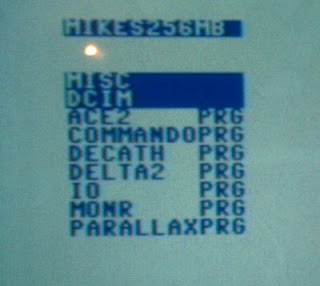Mmmmm....It just goes to show how well the MMC64 card was made. Currently I can load a full 64k in around 15 seconds (load is a loose term here...cycle through 64k of sectors is more like).
The MMC64 can load 61k in 3 seconds....damn thats fast! I think they allow proper access to it rather than SPI mode where the CPU "clocks" the bits in. I can probably speed that up by putting a PIC on there and having BYTE access to the card. But thats a LOT of work.
If I put a byte Read/Write port in there, then got the PIC to do the bit talking, then the Plus/4 could just read/write bytes. I guess that would be a x8 speed up (ish), but it might be a bugger to do. That would be almost on par with the MMC64 though, and with the higher clockspeed of the Plus4, I might even beat it.
I swapped the DataIn line from bit 3 (0-7) to bit 7, which meant I could use the BIT instruction to read it, there by freeing up the A register. So now I have a macro to read a bit like this...
GETBIT macro
stx port ; Clock pulse
sty port ;
asl ; Shift incoming data to make space for new bit
bit port
bmi !skip ; Bmi is reversed
ora #1
!skip
endm
This is a special ReadSector() call used when reading the actual data (does 4096 BIT reads - 512 bytes), the write is longer and far slower, but doesn't get used nearly as much. Before I moved the bit from 3 to 7, I had to LDA, then AND, then deal with memory etc.... but by using BIT I can and the AND from memory without affecting anything else. I suspect this is about as fast as it can go via the user port.
 SO, I've spent much of the day soldering away, and I've almost got the MMC part connected up. It's hard going though, and to top it all I think my soldering iron needs a new tip - again. The more I do of this, the more I wish I had that milling machine so I could just make a new board! Soldering in the sockets etc. is nothing, but stripping and soldering the wires is a nightmare!
SO, I've spent much of the day soldering away, and I've almost got the MMC part connected up. It's hard going though, and to top it all I think my soldering iron needs a new tip - again. The more I do of this, the more I wish I had that milling machine so I could just make a new board! Soldering in the sockets etc. is nothing, but stripping and soldering the wires is a nightmare!


